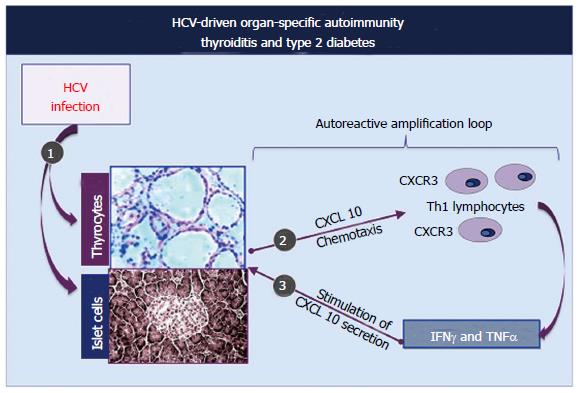Copyright
©The Author(s) 2015.
World J Hepatol. Mar 27, 2015; 7(3): 327-343
Published online Mar 27, 2015. doi: 10.4254/wjh.v7.i3.327
Published online Mar 27, 2015. doi: 10.4254/wjh.v7.i3.327
Figure 5 Immune-mediated thyroid involvement and diabetes type 2 can be observed in a significant percentage of patients with hepatitis C virus infection.
The figure summarizes the possible etiopathogenetic mechanisms involved in these two endocrine disorders. HCV thyroid infection may act by upregulating CXCL10 gene expression and secretion in thyrocytes (and pancreatic b-cells); CXCL10 may promote the recruitment of Th1 lymphocytes, which secrete interferon-γ (IFN-γ) and tumor necrosis factor-α (TNFα). In turn, these cytokines may induce CXCL10 secretion by thyrocytes (and pancreatic b-cells), thus perpetuating the immune cascade. The consequence may be the appearance of thyroid autoimmune disorders and/or diabetes type 2 in genetically predisposed subjects. HCV: Hepatitis C virus.
- Citation: Ferri C, Sebastiani M, Giuggioli D, Colaci M, Fallahi P, Piluso A, Antonelli A, Zignego AL. Hepatitis C virus syndrome: A constellation of organ- and non-organ specific autoimmune disorders, B-cell non-Hodgkin’s lymphoma, and cancer. World J Hepatol 2015; 7(3): 327-343
- URL: https://www.wjgnet.com/1948-5182/full/v7/i3/327.htm
- DOI: https://dx.doi.org/10.4254/wjh.v7.i3.327









